Russia Deploys Drones with Latest Iranian Glide Bombs
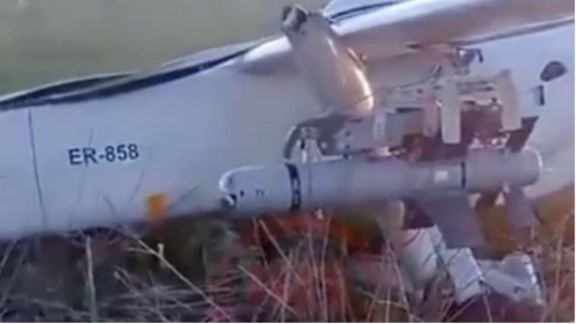
A downed drone found in the Kursk region of Russia was equipped with Iran's newest guided aerial bomb, revealing deepening military ties between Moscow and Tehran.

A downed drone found in the Kursk region of Russia was equipped with Iran's newest guided aerial bomb, revealing deepening military ties between Moscow and Tehran.
Julian Röpke, a military analyst for the German news outlet Bild, reported that the wreckage of an Iranian Mohajer-6 drone was discovered after an apparent crash on Sunday.
Analysis of video footage from the site revealed that the drone was armed with a Qaem-5 guided bomb, a recent development in Iranian weapons technology. The incident represents the first documented use of the weapon in Russia's invasion of Ukraine.
The Mohajer-6, primarily used by Russian forces for aerial surveillance, is believed to have been en route to the Sumy region for an attack before its unexpected crash, the cause of which remains unclear.
The Qaem-5 is part of a broader series of air-to-ground munitions designed specifically for compatibility with Iranian UAVs like the Mohajer-6 and Hamaseh. These bombs come in various forms, including laser-guided and infrared variants, with the Qaem-5 and Qaem-9 employing TV guidance systems that may also feature low-light capabilities.
Iran's Qods Aviation Industries manufactures the Mohajer-6, which has been in mass production since 2018 and is noted for its export success. The drone has a wingspan of 10 meters and is powered by either a Rotax engine or an indigenous variant, boasting capabilities suited for both reconnaissance and combat roles.
The event underscores the deepening military ties between Tehran and Moscow, evidenced by the transfer of weapons systems including kamikaze drones and now, potentially, ballistic missiles.
International concern has grown over Iran's role in bolstering Russia's military operations in Ukraine. Since mid-2022, Iran has provided Russia with over a thousand Shahed UAVs, which have been extensively used to target civilian areas and infrastructure across Ukraine.
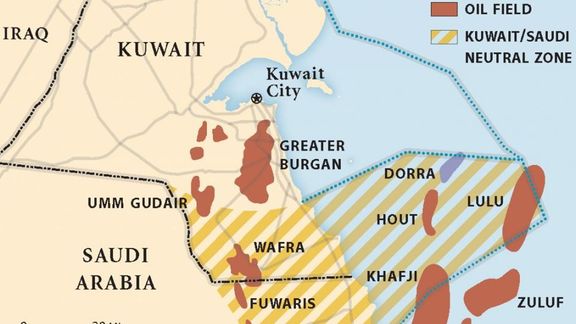
Forty percent of a gas and oil field in the western end of the Persian Gulf belongs to Iran, one of the top commanders of the Revolutionary Guard was quoted as saying on Tuesday.
Abdolreza Abed, the commander of IRGC’s construction and business conglomerate, Khatam al Anbiya, challenged Saudi Arabian and Kuwaiti claims that the field, off Kuwait’s coast, is within their territorial waters. Abed said that “Iran's entry into the Arash field is more essential than daily bread.”
He added, “The lack of determination and will to utilize Iran's gas resources in the Arash field has allowed neighboring countries like Kuwait and Saudi Arabia to start extracting from this field, while we in Iran watch them, waiting to see when a decision will be made for Iran's presence in the Arash field.“
Kuwait and Saudi Arabia have invited the Islamic Republic to negotiate over their territorial borders in the region.
The two Arab countries agreed in 2022 to jointly develop the field, which was discovered in 1967 and is estimated to have a total proven reserves of around 310 million barrels of oil and 20 trillion cubic feet of gas.
Saudi Aramco Gulf Operations Company signed a Memorandum of Understanding in December 2022 with Kuwait Gulf Oil Company (KGOC) to develop the joint field.
The development aims at producing one billion cubic feet of gas and 84,000 barrels of liquefied gas per day. The Arab countries call the field Al Durra, while Iran calls it the Arash Field.
In the dispute that dates back several decades, Iran claims any development without its consent breaks international laws, saying that 40 percent of the field is located in its territorial waters.
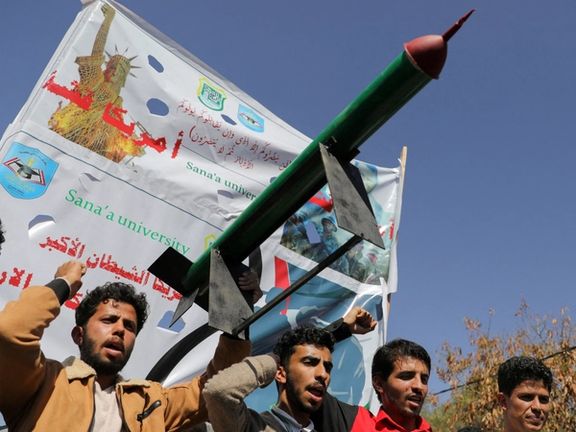
A Marshall Islands-flagged bulk carrier off the Yemeni coast took on water after being targeted with three missiles, maritime security and shipping sources said on Tuesday.
The ship issued a distress call, saying it had sustained damage to the cargo hold and was taking on water about 54 nautical miles southwest of Yemen's port city of Hodeidah, British security firm Ambrey said.
Greek shipping sources said the vessel, which bears the name Laax, was sailing to a port nearby to assess the extent of the damage. It was headed to the United Arab Emirates.
Its Greece-based operator Grehel Ship management did not immediately reply to a request for comment.
The United Kingdom Maritime Trade Operations (UKMTO) said separately on Tuesday that it had received a report of an incident 31 nautical miles southwest of Hodeidah.
The ship was hit by missiles and sustained damage, reporting an impact in the water in close proximity to the vessel, UKMTO said, adding that the crew were reported safe and the vessel was proceeding to its next port of call.
As an Iranian proxy group, the Houthis began attacking maritime commercial traffic in mid-November after Iran’s Supreme Leader Ali Khamenei called on Muslim countries to blockade Israel. The attacks were first limited to the Red Sea but later expanded to the Indian Ocean.
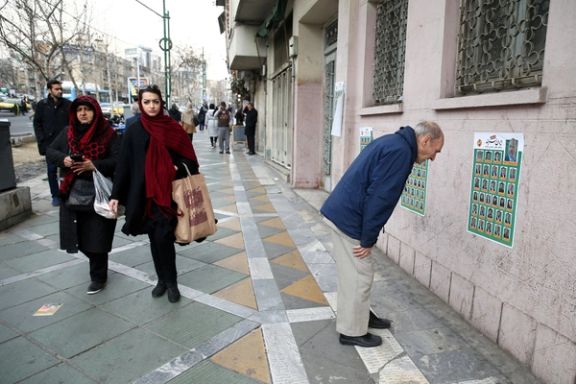
Registration for Iran's snap elections on June 28 will commence on Thursday, May 30, and will remain open for five days. As in previous elections, some candidates may wait until the last minute to officially register.
Here are some key figures likely to compete in the elections, pending approval by the Guardian Council, an unelected body filled with loyalists of Supreme Leader Ayatollah Ali Khamenei.
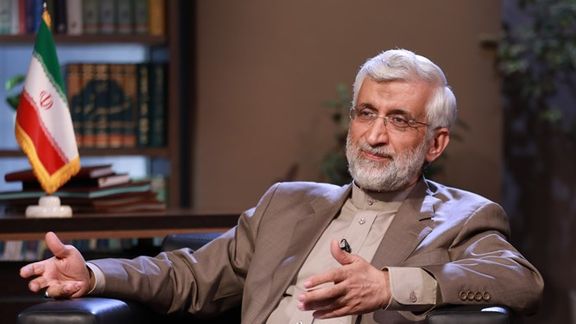
Saeed Jalili
On Sunday, the office of the 67-year-old hardliner announced his intention to run for the presidency. The former nuclear negotiator, who previously (and unsuccessfully) ran in 2013 against Hassan Rouhani and again in 2021 before withdrawing in favor of Raisi, formed a "shadow government" after his 2013 defeat. He maintained this "shadow government" under Raisi, where he is believed to have wielded significant influence.
Since 2008, Jalili has represented Khamenei in the Supreme National Security Council, where he was secretary from 2007 to 2013 under President Ahmadinejad. Many Iranians believe he is responsible for the failure of the 2015 nuclear deal with the West and the subsequent international sanctions.
Jalili is a devoted disciple of the late Ayatollah Mohammad-Taqi Mesbah-Yazdi, whose ultra-hardliner followers wield significant influence in the parliament, Raisi's administration, and the state broadcaster (IRIB). Although he does not publicly support any political party, he is widely believed to align with the ultra-hardliner Paydari (Steadfastness) Party.
Jalili has close ties with Jebhe-ye Sobh-e Iran (Iran Morning Front), led by the controversial Ali-Akbar Raefipour, popular among ultra-hardliner youth. The group, which describes itself as "anti-Zionism, humanism, and FreeMasonry," is known for its corruption revelations against Mohammad-Bagher Ghalibaf and his allies.
In 2021, Jalili proposed "The One Plan" to distribute energy subsidies equally to all Iranians, regardless of income, instead of the current income-based cash subsidies. He introduced the "One" unit, which could be used to buy fuel or electricity, and argued that it would allow individuals to sell saved units at any price or treat them as investments. The plan has not been implemented.
His supporters praise him as a "champion of transparency" and an anti-corruption politician with a simple lifestyle.
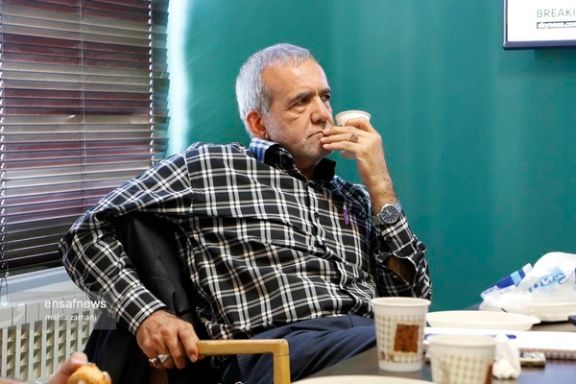
Masoud Pezeshkian
The ‘reformist’ lawmaker from Tabriz, East Azerbaijan's capital, announced his decision to run on Sunday. He previously registered for the presidency in 2013 but withdrew and registered again in 2020, only to be disqualified by the Guardian Council.
He claims that various people informed him he would not have been allowed to run in the March parliamentary elections without Khamenei's recommendation for approval, though he is uncertain about this.
Pezeshkian, one of the few tolerated reformists, served as health minister under Mohammad Khatami and as first deputy speaker of parliament from 2016 to 2020. The 70-year-old heart surgeon is popular in his constituency, where he has been repeatedly elected since 2008.
Pezeshkian's popularity in his constituency partly stems from his support for teaching Turki, the Turkic language spoken in his province and several others, in schools.
He occasionally criticizes authorities for extreme measures against women regarding hijab and protesters. At the time of his registration, he stated that his candidacy aimed to “increase voter turnout.”

Mohammad-Bagher Ghalibaf
This week, Ghalibaf won nearly 70% of the vote, defeating the ultra-hardliner Paydari Party’s Mojtaba Zolnuri (Zolnouri) and pragmatist conservative Manouchehr Mottaki, leading to his reinstatement as Speaker of the Parliament.
Ghalibaf came fourth in the March 1 parliamentary elections in Tehran, with his support for speakership dropping by 16% compared to four years ago. His win on Tuesday, however, may embolden him to run for the presidency. This victory ensures he can return to parliament and retain the speakership if he does not become president.
A perennial candidate, Ghalibaf ran unsuccessfully in the 2005 presidential election (won by Mahmoud Ahmadinejad), came second to Hassan Rouhani in 2013, and withdrew in favor of Ebrahim Raisi in 2017 (Rouhani won again). He was reportedly supported by the slain IRGC Qods Force commander, Ghasem Soleimani.
The 63-year-old politician and former Islamic Revolutionary Guards (IRGC) commander, police chief and mayor of Tehran and his immediate family and his allies have been accused of a host of corruption, particularly by ultra-hardliners.
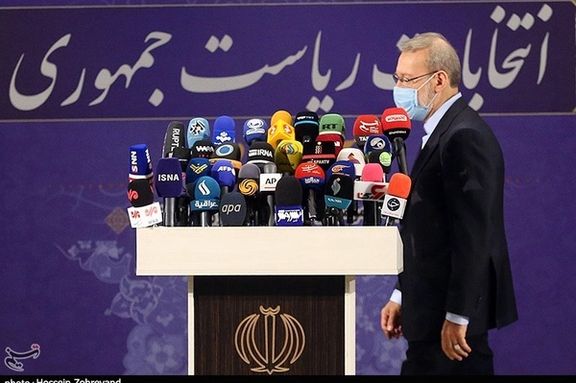
Ali Larijani
"Let's see what happens," said 66-year-old moderate conservative Ali Larijani, former Parliament Speaker, when asked about his intention to run on Monday. He is believed to be seeking assurances from the Supreme Leader that he will not be disqualified again.
Larijani, an insider for many years without political party affiliation, was a top figure in the Islamist political right, known as the Principlist camp. Khamenei appointed him to several high positions, including chief of the state broadcaster (IRIB) and various state councils. He served as secretary of the Supreme National Security Council and Iran's top nuclear negotiator from 2005 to 2007. Currently, he is a member of the Expediency Council and an adviser to Khamenei.
Larijani was barred by the Guardian Council from running against Ebrahim Raisi in 2021, allegedly because his daughter resided in the U.S. Before the elections, Khamenei called this disqualification an "injustice" without naming him, but did not reinstate Larijani through a state edict, as many had expected.
Larijani wrote a letter to Khamenei, thanking him for criticizing the disqualification and urging the Council to exonerate him. Despite Larijani's repeated demands for the Council to reveal the real reasons for his disqualification, this never happened.
Larijani has kept a low profile since then. Before the March parliamentary vote, ultra-hardliners spread a rumor that he was trying to lead an electoral block. In a brief letter, he refuted this, stating they could not "create fake rivalry" and interest in the elections through such rumors.
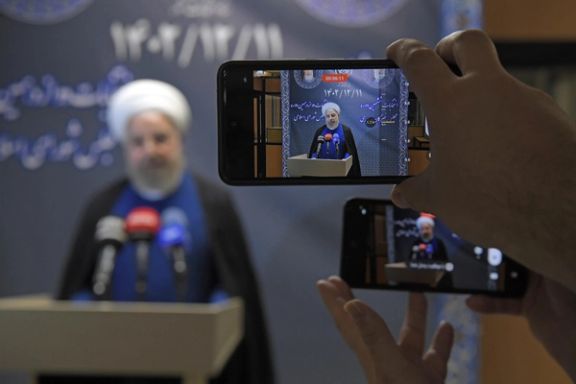
Hassan Rouhani
According to Heshmatollah Falahatpisheh, former chairman of the parliament’s National Security and Foreign Policy Committee, former moderate president Hassan Rouhani “may not be too reluctant” to run.
Rouhani has not yet commented on the snap elections or his decision to stand.
Twice president, the 75-year-old also served as secretary and chairman of the Supreme National Security Council (SNSC) for 24 years. In January, the Guardian Council barred him from running for the Assembly of Experts, where he had been a member since 1992.
Rouhani is closely associated with the 2015 nuclear deal, which initially received Khamenei’s blessing and aimed to establish direct talks with the United States. Hardliner opponents label the deal a "great treason."
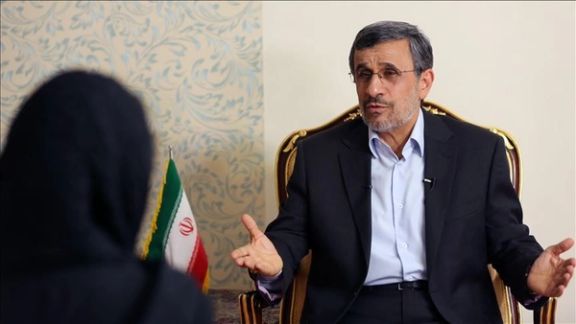
Mahmoud Ahmadinejad
Ahmadinejad, 63, has recently increased his public appearances but speaks cautiously about running. He states that his candidacy requires “comprehensive investigations” due to the “particular sensitivities” involved, possibly referring to his need for assurances that he won't be disqualified as he was in 2017.
Twice in the past few days, social media accounts representing Ahmadinejad have posted videos of him outside his house in eastern Tehran, speaking to supporters who "insist" he should run for president again. If approved, his candidacy could potentially increase voter turnout.
In February, Ahmadinejad’s former adviser Abbas Amirifar stated that Ahmadinejad was considering a 2025 presidential run but noted he would likely be disqualified by the Guardian Council if he registered.
Ahmadinejad dramatically fell out of Khamenei’s favor in 2011 after quitting work for eleven days in protest of Khamenei reinstating interior minister Heydar Moslehi, whom Ahmadinejad had fired. This led to Ahmadinejad and his supporters being harshly labeled the “deviant current” by Khamenei loyalists, who also accused him of "turning secular."
Ebrahim Raisi employed several of Ahmadinejad’s former allies in his cabinet, including Ahmad Vahidi (Interior Minister), Hossein Amir-Abdollahian (Foreign Affairs Minister), Javad Owji (Oil Minister), and Mehrdad Bazrpash (Minister of Roads and Urban Development). Bazrpash is also believed to be aspiring for the presidency.
Ahmadinejad and his core supporters are known for their own version of the apocalyptic Shia cult of the 12th Imam, Mahdi, believed to be in occultation by divine will since 941 CE.
The controversial former president, known for his Holocaust denial and enmity with Israel, has so far remained silent on the Gaza-Israel war and Iran’s own nationwide Woman, Life, Freedom protests of 2022-2023.
Ahmadinejad and his supporters are known for ruthless "revelations" against rivals. Many believe he holds corruption evidence against the ruling establishment, which he uses to intimidate authorities into tolerating him.
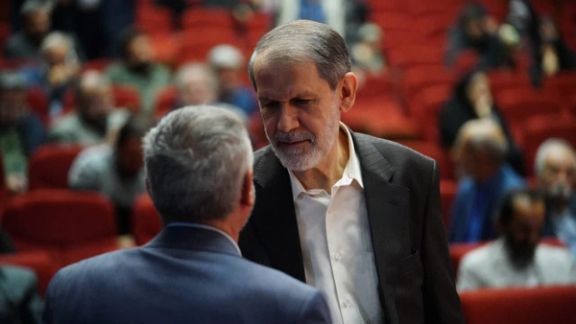
Sadegh Mahsouli
On Monday, the IRGC-linked Tasnim News Agency claimed that Sadegh Mahsouli, secretary general of the ultra-hardliner Paydari Party, has decided to run in the snap elections.
Mahsouli, a former IRGC officer and business tycoon, served in then-President Ahmadinejad’s cabinet as Minister of Interior and Minister of Welfare and Social Security. Once a close ally of the former president, Mahsouli distanced himself after Ahmadinejad's falling out with Khamenei.
While maintaining a rather low profile, Mahsouli's party extends its influence across government institutions, including President Raisi's administration. Its members, forming a significant minority in parliament, often lead amid the limited presence of established conservative and reformist parties.
Mahsouli's party faced a significant defeat in the parliamentary speakership vote on Tuesday, with its candidate, Mojtaba Zolnuri, receiving only 20% of lawmakers' votes compared to Ghalibaf's 70%.
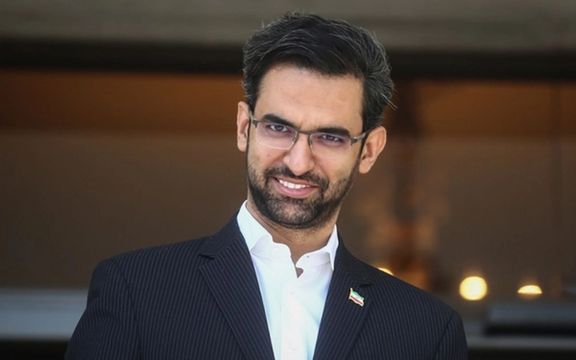
Mohammad-Javad Azari-Jahromi
Mohammad-Javad Azari-Jahromi, former Communications Minister under moderate Hassan Rouhani, has neither confirmed nor denied intentions to run.
On Monday, the 43-year-old stated that he wouldn't feel obligated to run if “worthy people with the ability of running the country [efficiently] enter the election scene”, while adding that people should feel personally “prepared” to run for the office.
Azari-Jahromi, an electrical engineer, dubbed the "Young Minister," advocates for fast internet access for all Iranians, free internet for students, expanded bandwidth, and lifting bans on social media platforms like X (formerly Twitter), Telegram, and Instagram.
Yet, many hold him responsible for the Islamic Republic’s repressive internet censorship and disruption of internet connectivity during the 2019 anti-government protests. He was designated by the US Treasury in November of the same year.
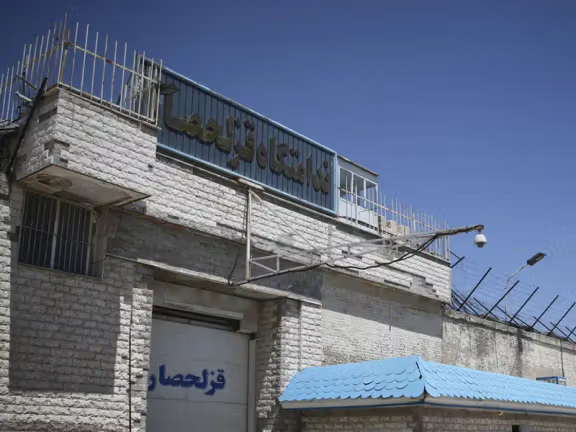
Female guards at a prison near Tehran have sexually assaulted the wife of a political prisoner under the guise of a "search" as state-sanctioned abuse in Iranian prisons continues, Iran International has learned.
Consistent with hundreds of similar reports from Iran's Me Too movement, the woman was stripped completely, subjected to verbal abuse and humiliation, before the sexual assault at Ghezelhesar Prison, near Tehran.
The severity of the assault was such that the woman suffered severe bleeding in addition to the psychological trauma, a source from the association of prisoner families at the prison claiming the practice is a daily occurrence.
From April to December last year, Human Rights Watch and Amnesty International released reports detailing "sexual assault" by agents of the IRGC, Basij, Ministry of Intelligence, and various police departments against women, men, and children during the protests following Mahsa Amini's death in police custody in 2022.
In May last year, several female civil and political activists shared their experiences during detention or imprisonment, describing how Islamic Republic forces forced them to strip completely naked in front of guards or on camera, allegedly to ensure they had not concealed anything.
The Iranian judiciary's news agency Mizan confirmed the occurrence of such strip searches yet claimed that "no images were recorded or taken" though it is widely reported by Me Too that such searches are conducted under the video surveillance of male guards.

YouTube has removed the account of Iran's Ministry of Foreign Affairs following the release of a video against Israel.
According to state media, the video entitled "Resistance, the Only Option for Palestine," called for "punishment of Israel", Iran's archenemy. Iran currently supports multiple Palestinian terror groups including Hamas, Islamic Jihad and Lion's Den, in its bid to destroy the Jewish state.
While Iran denies a direct role in the ongoing war in Gaza, triggered by Iran-backed Hamas's October 7 atrocities killing 1,200 mostly civilians, it has long armed, trained and funded the group proscribed by countries including the UK and US.
The YouTube deletion is part of a broader trend where major social media platforms have acted against accounts linked to Iran for violations related to spreading disinformation and breaking platform rules.
In 2020, YouTube, owned by Google, removed the British account of Iran's Press TV after it was exposed by Britain's The Times for engaging in anti-Israeli propaganda. In addition, in 2018, Google eliminated tens of Iran-linked accounts across its platforms, including YouTube, Blogger, and Google+, for disguising their affiliations while sharing political content in the US.
Further actions include Twitter's July 2019 suspension of several accounts affiliated with Iranian state media such as the country's supreme leader, who has since been reinstated, due to policy violations. Ali Khamenei among others remains a vocal user of Twitter in spite of calls for his removal.
Instagram also took measures in April 2019 by blocking accounts of Iranian leaders and commanders of the Islamic Revolutionary Guard Corps (IRGC), following the US designation of the IRGC as a terrorist organization.
The Iranian government has also engaged in crackdowns on internet freedom. In the wake of the nationwide protests following the death in custody of Mahsa Amini in 2022, Iran has blocked access to thousands of websites and platforms including WhatsApp and Instagram, in an attempt to control the flow of information and quell dissent.